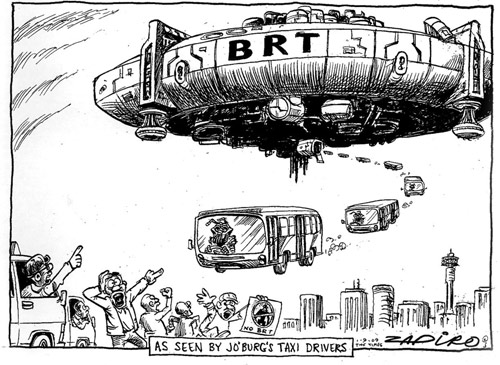Spanish football fans are celebrating in the streets, while in The Netherlands they are drowning their sorrows, but the real winners of the 2010 World Cup are the people of South Africa. Long after the last vuvuzela is sounded, residents and visitors will enjoy the legacy of new Bus Rapid Transit (BRT) systems build in South Africa’s four major cities.
Spanish football fans are celebrating in the streets, while in The Netherlands they are drowning their sorrows, but the real winners of the 2010 World Cup are the people of South Africa. Long after the last vuvuzela is sounded, residents and visitors will enjoy the legacy of new Bus Rapid Transit (BRT) systems build in South Africa's four major cities.

These BRT systems received little media attention during the games, which is good because transport systems are generally considered news only when something goes wrong. With few exceptions (there was one wildcat strike by drivers which left some fans stranded) the BRT systems operated as planned, successfully carrying tens of thousands of fans to the various venues safely and on schedule.

The BRT systems are game-changers, particularly for the many working poor living in townships, who can now travel with comfort, safety and affordability. For example, in the past, a trip from the township of Soweto to the city of Johannesburg cost typically more than 10 Rand on a crowded minibus, but on the new Rea Vaya ("We are Moving") BRT line they are 5 Rand, or 8 Rand for unlimited transfers within two hours. After paying commuting costs, a minimum-wage worker earning 6.88 Rand now brings home 45 Rand, compared with the previous 35 Rand, an 18% increase in income, plus faster speeds and greater comfort.
BRT systems have an interesting business model. The government owns and operates the bus lanes and stations, but private companies, usually worker cooperatives, own and operate the vehicles. The operators' profits and wages are based on the quality of service they provide, they are financially rewarded for courtesy, safe driving and clean vehicles.
The mini-bus operators initially opposed the new systems, resulting in violence against BRT operators and passengers, but after extended and difficult negotiations, last month Johannesburg Mayor Amos Masondo finalized an agreement for minibus operators to become shareholders in the new BRT operating company. Similar agreements are taking place in other cities.

As I mentioned in a previous blog, these systems will provide a model for high quality public transit service throughout Africa. Of course, there is still much to do. None of the BRT systems is complete, and to be truly successful they must be integrated with other transport system components and land use to create more livable and sustainable communities, but they are off to a very good start.
Congratulations World Cup winners: South Africans!

Analysis: Cybertruck Fatality Rate Far Exceeds That of Ford Pinto
The Tesla Cybertruck was recalled seven times last year.

National Parks Layoffs Will Cause Communities to Lose Billions
Thousands of essential park workers were laid off this week, just before the busy spring break season.

Retro-silient?: America’s First “Eco-burb,” The Woodlands Turns 50
A master-planned community north of Houston offers lessons on green infrastructure and resilient design, but falls short of its founder’s lofty affordability and walkability goals.

Test News Post 1
This is a summary

Analysis: Cybertruck Fatality Rate Far Exceeds That of Ford Pinto
The Tesla Cybertruck was recalled seven times last year.

Test News Headline 46
Test for the image on the front page.
Urban Design for Planners 1: Software Tools
This six-course series explores essential urban design concepts using open source software and equips planners with the tools they need to participate fully in the urban design process.
Planning for Universal Design
Learn the tools for implementing Universal Design in planning regulations.
EMC Planning Group, Inc.
Planetizen
Planetizen
Mpact (formerly Rail~Volution)
Great Falls Development Authority, Inc.
HUDs Office of Policy Development and Research
NYU Wagner Graduate School of Public Service


























